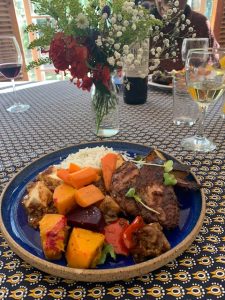

ZIMBABWEAN architect Mick Pearce, award winner for his ecological and sustainable designs at home and in Australia, China, the UK, Zambia and South Africa, recently celebrated his 84th birthday at home, with a grand return to partying.
After the privations of lockdown, here was an opportunity to once again greet friends with a full-body hug, to have fun, and indulge in an all-you-can-eat buffet for family and friends.

Jerk chicken, tofu, coriander rice and glazed carrots with hacha nuts.
Celebrity private chef, De Ankarra Chef, alias Chef Tafadzwa, was our host for the day. Chef Tafi is passionate about using traditional ingredients in Afro-fusion dishes, and on this occasion he created a fusion menu based on the Pacific Rim countries visited by Mick and his wife Carole.
Vegan mapo tofu, a Sichuan dish, was made in a rich and flavoursome sauce, and served with coriander rice. Tamarind and coconut fish curry, and sweet and sour eggplant were accompanied by curry leaf fried rice, and a butternut and beetroot salad. Glazed carrots were garnished with hacha nuts, fruits of the muhacha or mobola plum tree. Said to be tastier than almonds or pine nuts, hacha nuts provide an important source of protein during food shortages. For good measure, Chef Tafi served up a favourite from the Caribbean, a platter of Jamaican jerk chicken, slow cooked over a fire with fragrant spicy flavours.
Having acquired a sophisticated palate while travelling regionally and abroad, De Ankarra Chef is redefining African food and taking indigenous and organic vegetables, seeds, grains and fruits upmarket. Indigenous foods obtained from local, natural environments are delicious and healthy, and can play an important part in providing food security. Legend has it that when food was scarce, the ancestors would pray under the muhacha tree, and delicious fruit would appear on its branches. Considered a sacred tree in Shona religion, traditional ceremonies are still held in its shade.
Seated next to me at the party was Anna Brazier, a freelance consultant in sustainable development. A consultant for BIZ (Bio -Innovation Zimbabwe), a research organisation promoting underutilised plant species as new crops to strengthen food security, Anna is also the author of Harnessing Zimbabwe’s Indigenous Knowledge for a Changing Climate, published by the Konrad Adenauer Foundation. The book reveals that people in different communities still make traditional dishes, gather wild fruit, and make herbal medicines. Although some rural farmers continue to try and grow maize, poor soil, dry climate and extreme weather patterns contribute to crop failure.
Expensive maize seed and costly artificial fertilisers that further degrade the soil have encouraged a return to growing the crops of their grandparents – pearl millet, sorghum and rapoko.
Brazier pointed out that non-communicable diseases like BP and heart problems are on the rise. While these are exacerbated by eating processed foods, meat and many imported foods rich in sugar and oil, changing your lifestyle and eating smart foods such as zviyo sadza, mutakura (combination of peanuts, nyimo beans, nyemba and sugar beans, simmered together until soft), or okra and nyheve (spider flower), both cooked with onion and tomato, can give you a new lease on life.
As Zimbabweans, particularly those with wealthy lifestyles, become more health conscious, the range of delicious, nutritious indigenous foods continues to grow. As an alternative to a sugar fix, crop scientist Tracy Mapfumo has come up with a range of seed-based, and gluten-free health bars, marketed as Eny’s Treats.
A Zimbabwean startup, Hutano foods, makes snacks, breakfast cereals and porridges from locally grown millet, sorghum, marula, baobab fruits and mangongo nuts. Sourced from scores of small-scale farmers, and available in supermarkets countrywide, Hutano products create value on many levels.
The annual Good Food Festival, held in Harare’s Botanical Gardens, welcomes stall holders for traditional and organic seed, fresh produce and exciting lifestyle products. There’s something for everyone at this event, from traditional grains, legumes and herbs, to teas, cosmetics and small livestock. A food court supplies delicious food, while celebrity chefs compete in a fully equipped kitchen in the Battle of the Chefs.
Since being a winner in the Battle of the Chefs in 2016, De Ankarra Chef’s career has taken off. There’s always something to celebrate, whether it’s an 84th birthday, a promotion at work, a wedding anniversary, or a life well lived. To mark the occasion, can anything beat a traditional feast for family and friends, hosted by Chef Tafi?
Comments to: cmalakoff@gmail.com